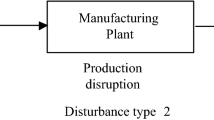Abstract
Large production variations caused by abnormal disturbances can significantly reduce the production capacity of a flexible manufacturing system (FMS). To prevent production delays, short-term capacity adjustment strategies can be used to augment the capacity of the FMS, such as working overtime, using alternative tools that are suited for faster processing, and producing parts outside of the FMS. We propose a mixed integer programming (MIP) model to obtain an optimal production plan for a multi-machine FMS. Our model evaluates both the FMS loading decision and the effective use of short-term capacity adjustment strategies to minimize the total part production cost. We develop an iterative procedure to solve the model that uses the Lagrangian relaxation method for finding lower bounds and a Lagrangian heuristic for obtaining feasible solutions. The procedure exploits certain special structures found in the Lagrangian multipliers which enable us to obtain good solutions to reasonably large test problems quickly.
Similar content being viewed by others
References
J.C. Ammons, C.B. Lofgren and L.F. McGinnis, A large scale work station loading problem, Annals of Operations Research 3 (1985) 319–332.
M. Berrada and K.E. Stecke, A branch and bound approach for machine load balancing in flexible manufacturing systems, Management Science 23 (1986) pp. 1316–1335.
A.K. Chakravarty and A. Shtub, Selecting parts and loading flexible manufacturing systems, in: Proceedings of the First ORSA/TIMS Special Interest Conference on Flexible Manufacturing Systems, eds. K.E. Stecke and R. Suri, Ann Arbor, MI (August 1984) 284-289.
M. Daskin, P. Jones and T. Lowe, Rationalizing tool selection in a flexible manufacturing system for sheet-metal products, Operations Research 38 (1990) 1104–1115.
D. Erlenkotter, A dual based procedure for uncapacitated facility location, Operations Research 26 (1978) 992–1009.
D. Fayard and G. Plateau, An algorithm for the solution of the 0-1 knapsack problem, Computing 28 (1982) 269–287.
M.R. Garey and D.S. Johnson, Computers and Intractability: A Guide to the Theory of NP-Completeness (Freeman, New York, 1979).
A.M. Geoffrion, Lagrangian relaxation approaches for integer programming, Mathematical Programming Study, 2 (1974) 82–114.
S. Graves, Safety stocks in manufacturing systems, Journal of Manufacturing and Operations Management 1 (1988) 67–101.
M. Held, P. Wolfe and H.P. Crowder, Validation of subgradient optimization, Mathematical Programming 6 (1974) 62–88.
V.N. Hsu, M. Daskin, P.C. Jones and T.J. Lowe, Tool selection for optimal part production: a Lagrangian relaxation approach, IIE Transactions 27 (1995) 417–426.
V.N. Hsu and R. de Matta, An efficient approach to recognize the infeasibility of a loading problem, The International Journal of Flexible Manufacturing Systems 9 (1997) 31–50.
L. Huang, J.Q. Hu and P. Vakili, Optimal control of a failure prone manufacturing system with the possibility of temporary increase in production capacity, in: Recent Advances in Control and Optimization of Manufacturing Systems (Springer, 1996) pp. 31-60.
U.S. Karmarkar, Manufacturing lead time, order release and capacity loading, in: Logistics of Production and Inventory (North-Holland, 1993) pp. 287-329.
Y. Kim and C.A. Yano, A new branch and bound algorithm for loading problems in flexible manufacturing systems, International Journal of Flexible Manufacturing Systems 6 (1994) 361–381.
P. Kouvelis and H.L. Lee, Block angular structures and the loading problem in flexible manufacturing systems, Operations Research 39 (1991) pp. 666–676.
Optimization Subroutine Library (1992) (SC23-0519-03), IBM Corporation.
S.C. Sarin and C.S. Chen, The machine loading and tool allocation problem in a flexible manufacturing system, International Journal of Production Research 7 (1987) 1081–1094.
K.E. Stecke, Formulation and solution of nonlinear integer production planning problems for flexible manufacturing systems, Management Science 29 (1983) 273–288.
K.E. Stecke, A hierarchical approach to solving machine grouping and loading problems of flexible manufacturing systems, European Journal of Operational Research 24 (1985) 369–378.
K.E. Stecke, Planning and scheduling approaches to operate a particular FMS, European Journal of Operational Research 61 (1992) 273–291.
K.E. Stecke and J.J. Solberg, Loading and control policies for a flexible manufacturing system, International Journal of Production Research 19 (1981) 481–490.
Author information
Authors and Affiliations
Rights and permissions
About this article
Cite this article
de Matta, R., Ning Hsu, V. & Feng, CX.(. Short-Term Capacity Adjustment with Offline Production for a Flexible Manufacturing System under Abnormal Disturbances. Annals of Operations Research 107, 83–100 (2001). https://doi.org/10.1023/A:1014942830746
Issue Date:
DOI: https://doi.org/10.1023/A:1014942830746




